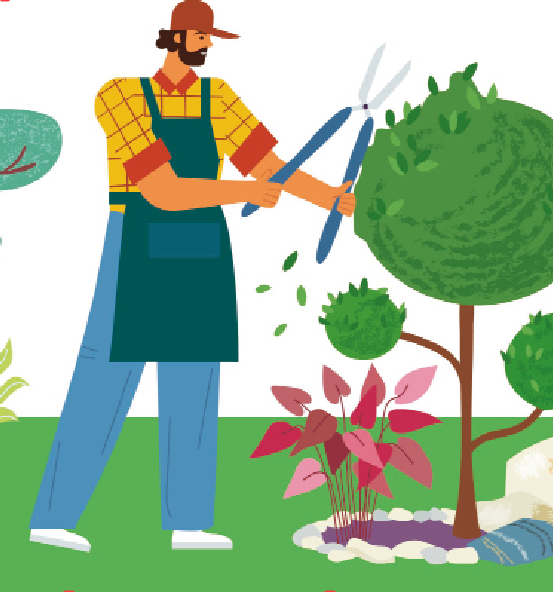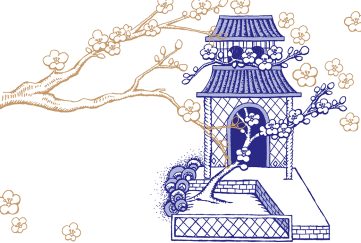Golden Days

UPLIFTING SHORT STORY WRITTEN BY GAIL WARRICK COX
Megan’s cottage was ready to give up its secrets… but would her discoveries turn out to be fruitful?
It was one of those golden days, still warm from the heat of summer, insects buzzing lazily, bluish grey shadows long and cool amid softly glowing gilded light.
Megan loved the start of autumn, before the trees blazed ruby and amber, before the clocks turned back and the evenings really drew in.
She had stepped into the garden to take a breather. She’d moved to her cottage in Perry Lane just three months previously and was decorating, keeping its character she hoped, but adding a few modern touches.
Hers was the middle one of a terrace of three, the only dwellings in a narrow lane on the outskirts of the village. They had slate roofs now, but Megan assumed at one time they would all have been thatched, the thickness of their walls, small doorways and low-beamed ceilings an indication of their age.
She loved hers, but living by herself and working from home as a graphic designer, she had occasionally felt a little isolated. Lonely, even. There just never seemed to be anyone else around. She didn’t even have any permanent neighbours.
The cottage to the right was a second home owned by John and June, a lovely middle-aged couple Megan had met just once since moving in.
The cottage on the left was unoccupied. Megan had no idea who it belonged to and noticed it had begun to look rather tired.
She took a sip from her glass of homemade lemonade. She’d found an old hand-written recipe for it tucked behind a shelf in the larder and had tried it out over the summer. It was delicious.
She sat on a rickety wooden bench, her back against the rear wall of the house, and surveyed her garden. It was long and narrow; all three were similar, with pretty cottage garden flowers near the houses, small vegetable patches further down and fruit trees at the end.
A flutter of birds chitter-chattered in the dappled shade of her pear trees, busily foraging for bugs and worms, pecking at pink-tinged windfalls, making the most of the golden days of early autumn before their long migrations. Megan smiled at the sight of their bobbing interactions. It must be nice to have someone to chat to in the garden.
She drained her glass. Time to start work again. She was removing stubborn layers of wallpaper from her tiny hallway, hoping to make good any crumbling plaster, then whitewash the walls to give a more spacious feel.
She had wetted one wall and begun scraping the paper off. It was tough going, the dry old layers absorbed a lot of water before they eventually loosened from the plaster. She dampened the other wall as well, give it a chance to soak while she carried on scraping.
After a few minutes, she turned back to see how it was getting on and was surprised to see that the water had exposed an imprint of something beneath the paper.
Intrigued to find out what it was, Megan prised up a tiny stiff corner of paper, gave it a tug and managed to pull a great swathe of it away in one fluid movement to reveal a narrow wooden door.
It had no handle, just a small round hole about halfway up on one side, the hinges opposite black and bubbled with rust. A cupboard, perhaps. But why was it papered over? She hoped there wasn’t something gruesome hidden inside.
She slid her fingers into the hole and pulled. The door didn’t budge; it was locked from the inside.
A rush of apprehension quivered through Megan. Who locked a hidden door from the inside?
She felt around. Above the hole was a metal bar. A latch. She pushed it up, felt it disengage from its cradle and the little door swung slowly open with a creak.
An earthy aroma seeped from what appeared to be a large cupboard built into the wall.
But it was more than that. The floor was cut away with a ladder-like set of steps that disappeared into the blackness beneath. Megan grabbed her phone and used its torch to shine a silvery beam into the darkness.
It was difficult to see anything; she would need to climb down. She propped the door open and gingerly began to make her descent.
At the bottom of the steps, she cast the light around. Her breath was taken by the sight of a cavernous cellar that ran the full breadth of all
three cottages.
Rough stone arches supported the dividing walls above, the floor paved with smooth grey flagstones. Slatted wooden crates lay piled up in the corners and a couple of mysterious-looking contraptions stood in the centre of the gloomy space.
One consisted of a metal frame, about waist high with a tapering square metal container on top and a turning handle at the side. The other was wooden, with a barrel-like bucket standing on a tray and a large T-shaped handle on top.
They had an air of vintage machinery about them; Megan had no idea what they were for.
She climbed the steps and went into the garden, feeling the need for sunlight on her face after the chilly darkness of the secret cellar.
She sat on the bench, the birds still chatting in the dancing light beneath the pear trees. She closed her eyes, enjoying the gentle hum of insects and whispering breeze that softly warmed her cheeks with mild autumn air.
The tranquillity of the moment was shattered by a high-pitched whirring. Megan jumped up almost before she had opened her eyes. The noise came from the empty cottage to the left.
She peeked over the fence. A man in a lumberjack shirt, fraying cut-off jeans and sandy-coloured work boots was drilling the wall by the back door.
Despite the shrill sound, he seemed to be aware of her presence. He released the drill’s trigger and turned around, his smile broad, unruly curls jangling over his forehead.
“Sorry about the noise,” he said. “Just patching a few things up. I’m Jed.”
“Megan. Is this your place, then? Sorry, I didn’t mean to be nosey.”
“It’s OK,” he replied. “It’s my grandad’s cottage. He’s been staying with Mum for a while after a fall, but he’s coming home soon so I’m getting it ready for him.”
“That’s nice. Has he lived there long?”
“All his life. He was born here.”
“Wow. He’ll be pleased to get back.”
“Yes – as long as I can get it all finished in time.”
“I’d better let you get on,” she said.
As she made her way back indoors to resume the wallpaper scraping, the sound of Jed’s drill started up again. It was strangely comforting knowing that someone else was close by.
The next morning, John and June’s car was parked in the road. Megan spotted June weeding her vegetable patch and went outside.
“Hi, June! That looks like hard work,” she said.
“Just trying to get a bit shipshape.
John’s able to work from home now and if I can get a part-time job locally, we might move in here permanently.”
“That would be great,” Megan said. The more neighbours the better, as far as she was concerned.
“Yes, it’s time for a change,” June went on. “Even though we’ve owned this property for a while, we feel we’ve never really got to know it or the area. We’d like to do that now.”
“Ah,” Megan said. “Speaking of knowing the property, are you aware there’s a huge cellar under the cottages?”
June stopped weeding, clumps of soil dropping from her gloved hands. “Really?” she said, shaking her head.
“Perhaps you and John should come and see it,” Megan suggested.
The three of them stood in her tiny hallway peering into the black hole in the cupboard floor. Megan’s phone torch illuminated the ladder steps, speckles of starry dust hanging in the beam of light.
June left it to John to take a look.
Megan went first, then held the light for John. When he reached the flagstone floor, he let out a gasp so loud, June called down to check if he was all right. He reassured her from the echoey depths. Megan shone her phone torch around the space, John spun on his heel, following the light to take it all in.
“I can’t believe this is here and we didn’t know about it,” he said. “I wonder what it was used for. And how did those strange gadgets get down here? They’re too big to come the way we just did.”
“I know,” Megan replied. “The whole thing’s a bit of a mystery.”
John tried to turn the handle on the metal device, but it was seized up and wouldn’t budge. There were interlocking teeth in the bottom of the square container on top of the frame.
“This might be some sort of shredder or pulper,” he said. He cast his eye over the wooden contraption. “Not sure what that one is – it looks even older. There’s definitely been something going on down here in the past.”
Back up in the hall, June had some news for Megan.
“A young chap from next door called round,” she announced. “He’s fixing broken slates and noticed you’ve got one missing. He said he can replace it while he’s up on the roof. Just shout up to him if you want it done. He seems very nice.”
John and June exchanged a smile.
Outside, Megan raised a hand to shield her eyes from the honey glow of the autumn sun low in the sky. Jed was pulling broken slates from the roof, replacing them with new ones. She called up to him.
“Hi, Jed. Yes, please, can you do mine while you’re up there?”
He gave her a thumbs-up, his face breaking into that dimpled smile. She guessed he didn’t want the distraction of a conversation while up a ladder, so went to fetch a glass of lemonade for when he came down.
Standing either side of the fence that separated the gardens, Megan and Jed looked up at the cottage roofs.
“Should be watertight now,” Jed said. He drank the last drops of his lemonade and presented Megan with the empty glass. “That was awesome,” he said.
Megan’s cheeks blushed with a tinge of pink, like the windfalls .
“It’s from an old recipe I found in the larder,” she explained.
“Homemade things are always nicer,” Jed replied. “Anyway, I’d better crack on. Grandad Max is moving back in later today and I want to get everything finished before he arrives.”
Megan felt a slight pang of sadness. If everything was done, would that mean Jed wouldn’t be there so much? It had been nice having him next door with his noisy drill, dimply smile and helpful nature.
Still, at least his grandad would be around – and hopefully John and June would, too.
That evening, Megan made a fresh batch of lemonade. She would take some round to Jed’s grandad tomorrow and introduce herself, let him know she was there if he needed anything.
The next day, John and June were tidying their front garden when Megan came out to call on Jed’s grandad.
“We’ll tag along too, if that’s OK,” June said. “We ought to say hello if we’re going to be neighbours.”
Jed answered the door.
“We’ve come to introduce ourselves to your grandad,” Megan said, “and I’ve brought lemonade.”
“Great, he’ll love that. Come on in and meet him.”
Inside, the cottage was the same layout as Megan’s, except that it had a wider hall. No secret cupboard or staircase, she thought.
Despite having been away recuperating, Grandad Max was sprightly and convivial. Wavy white hair flopped over his forehead when he laughed, and his cheeks creased with familiar dents as he smiled.
He was pleased to meet them all, thanked Megan for the lemonade and commented how nice it was to have a homemade drink.
“Of course, years ago it was all homemade,” he said. “In fact, these three cottages were renowned for the production of really good-quality perry.”
“Perry?” Megan queried.
“Yes, a bit like cider, but made with the finest fresh pear juice.”
“So, that’ll be why it’s called Perry Lane then,” Jed said.
“Exactly,” Grandad Max confirmed. “Perry was made here for years and stored down in the cellar.”
“What cellar?” Jed asked.
“The secret one under the cottages,” Megan informed him.
“Wow. I never knew that.” Jed’s eyebrows disappeared up under his curls.
Grandad Max explained how years ago the occupants of all three cottages would produce perry together using pears from the gardens.
Boxes of pears would be lowered into the cellar via large trapdoors in his pantry, and kept in the cool until they were needed. A crusher was used to mush up the pears, the juice extracted with a press, then strained and fermented to make the perry.
“So that’s what those two contraptions are in the cellar,” John said.
“Why did perry production stop?”
“Oh, you know what it’s like. New people moved in, they had busy lives, weren’t interested and I couldn’t do it all on my own. So, the cellar was boarded up and that was that.”
“Seems such a shame,” June said. “All those lovely pears going to waste.”
It was one of those golden days, still warm from the heat of summer, insects buzzing lazily, bluish grey shadows long and cool amid softly glowing gilded light.
“Hey,” Jed called from the back door of Megan’s cottage. “Those pears won’t press themselves, you know. No time to sit around on rickety old benches drinking homemade lemonade, we’ve got orders to fill.”
His curls jangled merrily over his forehead, his dimpled smile wide.
“Won’t be a second,” Megan called back. She could hardly believe what had happened in the year or so since she had come to live in Perry Lane.
John and June had moved in permanently. Jed stayed on next door to take care of Grandad Max, although he didn’t really need help.
He was fine.
After hearing about the perry production, the five of them had got together and tried it out last autumn. It had been great fun, getting the old machines working, rigging up lights in the cellar, collecting pears and learning how to make the perry.
They had sold what they produced at a local farm shop. It had been so popular that this autumn they’d decided to step up production and start a small business with June taking care of accounts and licensing, Megan responsible for coming up with a name and marketing, and everyone pitching in to make the perry under Grandad Max’s supervision.
Megan drained her glass of homemade lemonade. Time to start work again. Jed was suddenly beside her.
“Come on,” he said, holding his hand out to her. “We’ve got pears to press.”
Megan hesitated for a moment. She looked down the garden. A flutter of birds chitter-chattered in the dappled shade of her pear trees, busily foraging for bugs and worms, making the most of the golden days of early autumn before their long migrations.
“I think I know what to call our Perry,” she said.
“Great,” Jed replied. “What have you come up with?”
“Golden Days,” Megan said.
“Golden Days Perry. That’s perfect!” Jed replied. He squeezed her hand and gave her a little kiss.
And as they walked back into her cottage, Megan’s cheeks blushed with a tinge of pink like the windfalls at the bottom of her garden.
Read more uplifting short stories:
Read Open Mic Night, Old Friends, Curtains Up, plus many more in our archives.




